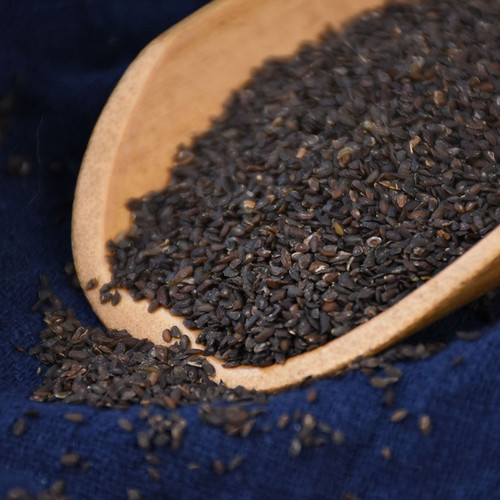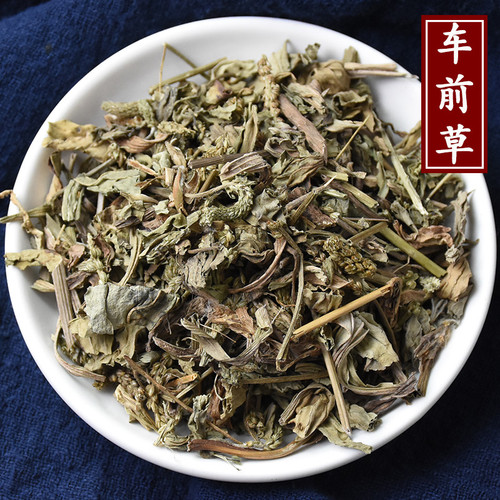Product Overview
Parts used: Dried ripe seeds
TCM category: Herbs that drain Dampness
TCM nature: Cool
TCM taste(s): Sweet
Meridian affinity: Kidney Liver Lung Small intestine
Scientific name: Plantago asiatica or Plantago depressa
Other names: Obako seeds, Arnoglossa seeds
Use of plantain seeds (Che Qian Zi) in TCM
Please note that you should never self-prescribe TCM ingredients. A TCM ingredient is almost never eaten on its own but as part of a formula containing several ingredients that act together. Please consult a professional TCM practitionner, they will be best able to guide you.
Preparation: Remove the impurities and fry the seeds until you hear cracking. Spray salt water on the seeds and dry them.
Dosage: 3 - 9 grams
Main actions according to TCM*: Encourages urination and clears Heat. Stops diarrhea by expelling water through urination. Brightens the eyes, used in combination either for Deficiency or Heat. Reduces inflammation of infections. Arrests cough and expectorates Phlegm.
Primary conditions or symptoms for which plantain seeds may be prescribed by TCM doctors*: Edema Dysuria Diarrhea Conjunctivitis Phlegm Coughing Urinary tract infection
Contraindications*: Should not be used during pregnancy, constipation, Deficiency of Qi or with signs of Damp Heat.
Common TCM formulas in which plantain seeds are used*:
For impotence, spermatorrhea, premature ejaculation, weak and low sperm count combine plantain seeds with cuscuta seeds (Tu Si Zi), goji berries (Gou Qi Zi), palmleaf raspberries (Fu Pen Zi) and schisandra berries (Wu Wei Zi).
For Kidney deficiency with lower back pain and impotence combine plantain seeds with palmleaf raspberries (Fu Pen Zi), goji berries (Gou Qi Zi) and cuscuta seeds (Tu Si Zi).
For hypertension combine plantain seeds with field thistles (Xiao Ji) and japanese thistle (Da Ji).
For Blood-Heat and Damp-Heat with swelling, dark urine and edema combine plantain seeds with verbena leaves (Ma Bian Cao), achyranthes roots (Niu Xi) and flowering quince (Mu Gua).
Key TCM concepts behind plantain seeds (Che Qian Zi)'s properties
In Traditional Chinese Medicine (TCM), plantain seeds are plants that belong to the 'Herbs that drain Dampness' category. These herbs are typically diuretics, meaning that they promotes the increased production of urine in order to remove Damp that has accumulated in the body. According to TCM Damp accumulates first in the lower limbs, causing edema and impaired movement. From there, if unchecked, it can move upward and impair digestion and eventually the respiratory system.
Furthermore plantain seeds are plants that are Cool in nature. This means that plantain seeds tend to help people who have too much "heat" in their body, although with less effect than a plant that would be Cold in nature. Balance between Yin and Yang is a key health concept in TCM. Those who have too much heat in their body are said to either have a Yang excess (because Yang is Hot in nature) or a Yin deficiency (Yin is Cold in Nature). Depending on your condition plantain seeds can help restore a harmonious balance between Yin and Yang.
Plantain seeds also taste Sweet. The so-called "five elements" theory in Chinese Medicine states that the taste of TCM ingredients is a key determinant of their action in the body. Sweet ingredients like plantain seeds tend to slow down acute reactions and detoxify the body. They also have a tonic effect because they replenish Qi and Blood.
The tastes of ingredients in TCM also determine what organs and meridians they target. As such plantain seeds are thought to target the Kidney, the Liver, the Lung and the Small intestine. According to TCM, the Kidneys do not only regulate the urinary system but also play a key role in the reproductive system and the growth and aging process of the body. The Liver on the other hand is often referred as the body's "general" because it is in charge of regulating the movements of Qi and body fluids. It also takes a leading role in balancing our emotions. In addition to performing respiration, the Lungs are thought to be a key part of the production chain for Qi and the body fluids that nourish the body. Like the Stomach, the Small Intestine has a digestive role, extracting the "pure" part of what we injest to the Spleen and the "impure" down to the Large Intestine.








